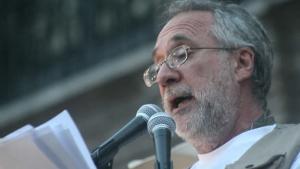 “For some,” writes Javier Sicilia, responding to critics within his own fledgling movement, “to dialogue is to capitulate.” If you haven’t humiliated your adversary, you have failed. But to change the dynamic of the violence that has beset the country over, especially, the past five years, he argues, it is necessary to change the discourse of violence. “Since March 28,” he writes, “when the Movement for Peace with Justice and Dignity began its work, there began a change in the language of war and pain.” The change, for Sicilia, reflects the belief system of militant Gandhian nonviolence—the commitment to face power with resistance and sacrifice; the willingness to publicly absorb oppression in order to end it.
“For some,” writes Javier Sicilia, responding to critics within his own fledgling movement, “to dialogue is to capitulate.” If you haven’t humiliated your adversary, you have failed. But to change the dynamic of the violence that has beset the country over, especially, the past five years, he argues, it is necessary to change the discourse of violence. “Since March 28,” he writes, “when the Movement for Peace with Justice and Dignity began its work, there began a change in the language of war and pain.” The change, for Sicilia, reflects the belief system of militant Gandhian nonviolence—the commitment to face power with resistance and sacrifice; the willingness to publicly absorb oppression in order to end it.
Sicilia, a poet, political columnist, and father of a murdered son whose body was found on March 28, is the leader of a broad-based movement to confront Mexico’s violence. The poet’s movement and discourse are increasingly taking on the language and character of nonviolent resistance. As his marches and caravans cross the country, he writes of the movement’s motives in his regular column for the weekly magazine Proceso:
“To rebuke the violence that has taken away our loved ones; to make visible the victims who have been attacked and immersed in impunity; to name our dead; to display the state of inhumanity into which this country has fallen; to cross half the country to embrace one another, share consolation and insist upon the responsibilities of the state in the face of our pain; to sit before the authorities of the nation so that they understand the debt they have contracted with us…we dialogue and look together for a re-foundation of the country….”
And this: “On renouncing violence in the name of dignity and the firmness of nonviolence, we have had nothing to offer our adversaries but the same thing we have offered to all: love and its purest weapons, resistance and sacrifice.”
And this, on May 8, in Mexico City’s central plaza, the Zócalo:
We are here to say that “we will not convert this pain of the soul into hatred or more violence; but into a lever that will help us restore love, peace, justice, dignity and the stammering democracy that we are losing; to tell [the authorities] and ourselves that we still believe that it is possible for the nation to be reborn and to arise from the ruins, to show the lords of death that we are standing and that we will not stop defending the lives of the sons and daughters of this country, and that we sill believe it is possible to rescue and reconstruct the social fabric of our communities, neighborhoods and cities.”

